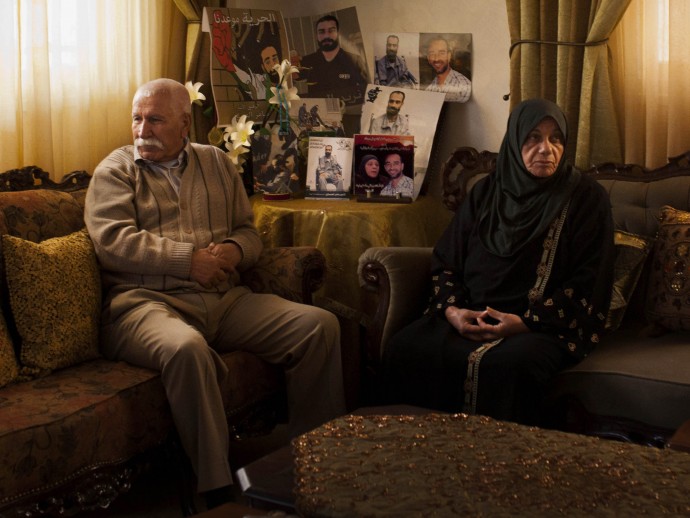
Update from Mint Press News:
After more than 277 days on hunger strike, Palestinian detainee Samer Issawi will end his fast after Israeli and Palestinian authorities reached a deal this week that would send Issawi to his home in Jerusalem after he serves an additional eight months.
According to Qadura Fares, head of the Palestinian prisoner organization, Issawi was arrested eight months ago for allegedly violating bail conditions from an earlier release. The 32-year-old lapsed into grave physical condition in recent months while fasting to protest his prolonged time behind bars without charge or trial. Issawi received some intravenous nutritional assistance but has been near death after losing 70 pounds. After signing an agreement Tuesday night, Issawi is expected to resume eating regularly and could make a full recovery.
Many in Israel believe that the deal was brokered to avoid riots and violence if Issawi died. An Israeli court originally convicted him of opening fire on an Israeli bus in 2002, but he was released in 2011, along with more than 1,027 Palestinian prisoners, in exchange for Gilad Shalit, an Israeli soldier held hostage by the Hamas in Gaza.
There are still roughly 4,713 Palestinians being held in Israeli jails — 169 are held under military administrative detention.
Mint Press News April 18 coverage of Samer Issawi’s hunger strike:
More than 3,000 Palestinian prisoners in Israeli jails took part in a 24-hour solidarity hunger strike on Wednesday, demanding improvements to prison conditions and the release of hundreds who are languishing without charge or trial. According to the Israeli human rights organization B’tselem, there are currently 4,713 Palestinians in Israeli jails, 169 of who are being held indefinitely under military administrative detention.

Thousands across Gaza, Israel and the West Bank took to the streets Wednesday in annual Prisoner Day rallies in support of the thousands in Israeli prisons.
“Prisoners who are held without charge should be released. There should be no halfway compromises, there should be no deportations. It goes against many of the conventions of the international community,” Yousef Munayyer told Mint Press News. Munayyer is executive director of the Washington, D.C.-based Jerusalem Fund.
Throughout nonviolent demonstrations, which included sit-ins and marches, the focus continued to be on Samer Issawi, a prisoner on the brink of death, the result of a hunger strike lasting 256 days as of press time. Kept alive with intravenous nutritional assistance, Issawi nonetheless remains in a grave state after having lost more than 75 pounds.
Issawi is one of seven Palestinian prisoners carrying out prolonged hunger strikes protesting poor prison conditions and the use of administrative detention.
“Well, [hunger strikes] are probably not the most effective method to change Israeli behavior. In the absence of another capacity, state-level capacity or the involvement of the international community enforcing human rights, Palestinians are left to resort to civil disobedience tactics that require a degree of self-reflection by Israelis to realize the inhumanity in their actions,” Munayyer said.
Israeli authorities contend that Issawi is connected to terrorist activities but have not charged him with a crime since putting him behind bars. Israeli and Palestinian leaders expect widespread demonstrations and potential riots should Issawi die.
“I think the immediate reaction will be mourning and anger among Palestinians who have sacrificed a great deal. It is clear that this is an issue that is touching Palestinians in every corner of Palestine. There is no Palestinian family that has not had family or friends in Israeli prisons,” Munayyer said.
This sentiment was echoed by Saeb Erekat, a senior Palestinian official who repeatedly has demanded that foreign governments, including the U.S. and those comprising the EU, pressure Israel to secure Issawi’s release. On the eve of Prisoners’ Day, Erekat wrote,
“The fate of Mr Issawi is being followed very closely by millions of Palestinians, Arabs and supporters of justice worldwide. The situation is potentially explosive and any harm that comes to him will undoubtedly lead to a serious eruption of violence that will make any sort of political progress unlikely.”
Last month, while President Obama visited Israel, Issawi released a statement from prison rejecting an Israeli compromise offering to deport him to Gaza or Europe. Issawi hails from the West Bank, and any transfer to a foreign country or territory would violate international conventions.
“I strongly refuse to be deported to Gaza, as this practice will just bring back bitter flashbacks from the expulsion process which our Palestinian people were subjected to during 1948 and 1967,” Issawi said last month, a reference to the violent Arab-Israeli conflicts that resulted in Israel’s occupation of new territory.
Munayyer concluded, “I think [deportation] is inappropriate and is, in fact, reflective of the general relationship Israel has with the Palestinians. It commits a violation of human rights by giving you a half or a quarter of something.”

